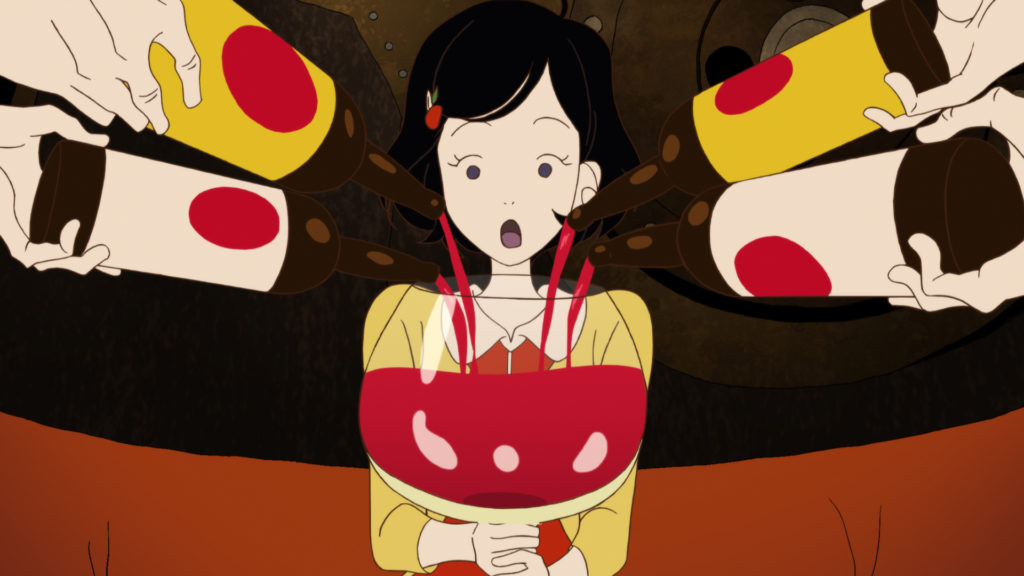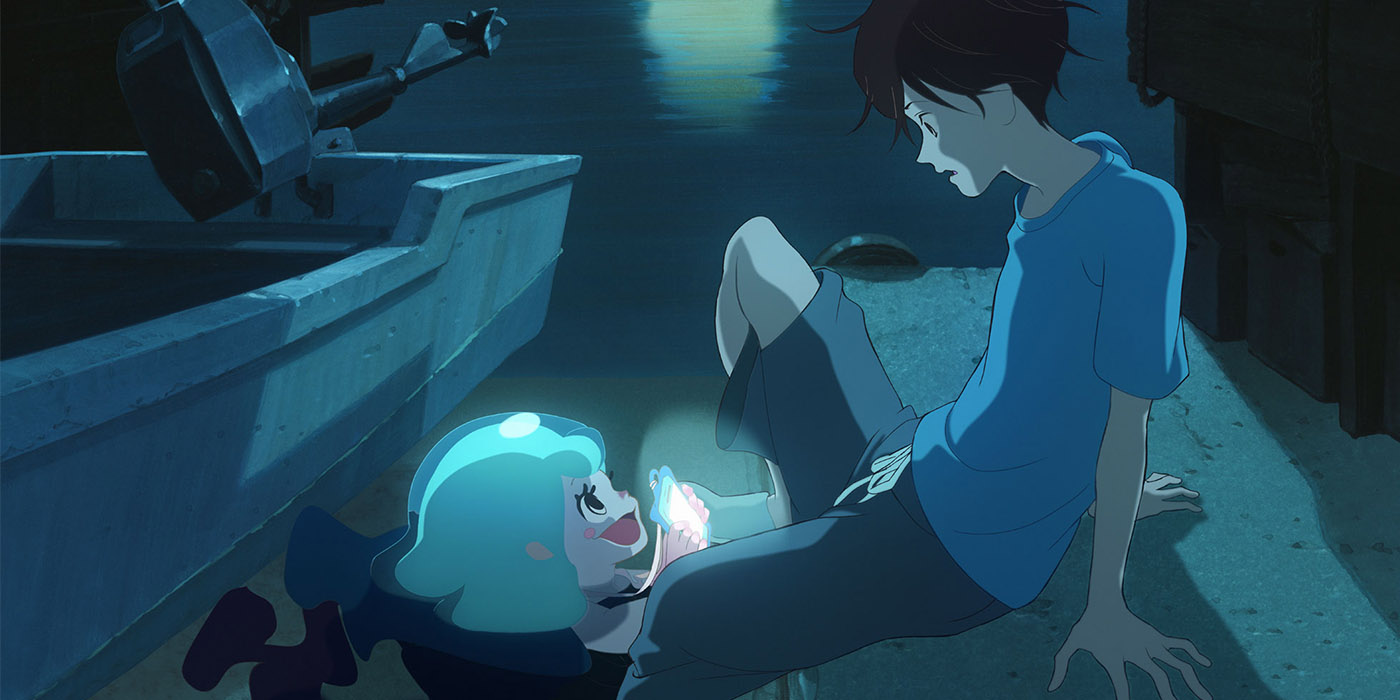I talked about this at length in my previous review of Lu Over The Wall a few months ago, but anime maestro Masaaki Yuasa is on an incredible creative tear right now, between the critically acclaimed reinvention of Go Nagai’s trash classic Devilman in Devilman Crybaby (which you can watch on Netflix right now), the fun for all ages Lu, and this week’s US release of his pseudo follow-up to one of his earliest breakouts in The Night is Short, Walk On Girl.
It’s a bit of a mouthful of a title, but it hails from the book by Tomihiko Morimi, the same author that Yuasa also adapted for his 2010 animated The Tatami Galaxy. As a matter of fact, both works share a number of characters and are ostensibly set in the same corners of Kyoto. But it’s worth noting, if you tried that previous work and found yourself struggling to keep up with its breakneck dialogue delivery and more outre aspects – you might be in for a rough ride, as this is the material where Yuasa gets to exorcise a number of creative whims and off the wall ideas. On the other hand, if you’ve gotten this far in his filmography and are ready for what is basically a masterclass in “what did I just watch?” then this just might be the film for you.
In a nutshell, The Night is Short, Walk On Girl shares some DNA with a movie like After Hours, one of the great underappreciated Scorsese efforts (and funny enough, the title of an equally great Haruki Murakami novel with a similar pitch). It’s the story of wandering about into the wiles of a city and discovering what kind of surreal hijinks are waiting around every corner. It’s also the story of pursuing love, even to the point of some level of obsession. It’s the tale of two divergent teens, Senpai – a young man struck by his attraction to the heroine of the piece: The Girl with Black Hair. And while attempting to catch up with her after being in the same restaurant at the same time, Senpai winds up going one way, while The Girl heads another, occasionally crossing paths along the way.
It’s a long-winding journey they go on, and throughout, it tests your potential patience with Senpai himself. He’s driven simply for his affection/obsession with The Girl, whereas she’s just out for a good time, to experience what all life has to offer, and to avoid lecherous old men in the process. Neither character is especially fleshed out beyond some of the barest essentials, but much like the classics of post-modern fiction, the central characters are rarely the main points of interest. Instead, this is a foray into a universe just beneath our own, that operates within the margins of Kyoto and within the doorways of a number of its drinking holes.
To give you a sense of the scope of their journey (really hers, but he’s never quite out of pursuit until circumstances dictate otherwise), after learning of a legendary whiskey called Imitation Denki Bran, she goes on a drunken pursuit of this seemingly unobtainable spirit from establishment to establishment, eventually finding herself in a drinking competition with its creator: a con-man who travels on a three-story train.
From there, The Girl, drink after drink, wanders into new quests where she encounters colorful characters like Don Underwear, a playwright who has vowed to not change his undergarments until he again crosses paths with a missed connection and the almost other-worldly Hanuki and Higuchi (returning character who previously appeared in The Tatami Galaxy) join her in the revelry as she then opts to hunt for a book that cherished from her childhood. At the same time, Senpai, who has embarked upon what he dubs “Operation AHO” (Appear before Her Often), meets characters like the God of the Old Books Market, and ends up taking part in a competition of his own: eating noodles so spicy his lips grow to enormous size.
It’s quite the trip, and that doesn’t even mention how the night goes on so long that an entire year passes, or the guerilla theatre troupe that plays a pivotal role in the events of their evening, or how they’re all being stalked by their University’s Bedroom Investigation Committee.
I’m not sure even Thomas Pynchon could have crafted this kind of fever dream scenario. If Lu Over The Wall was Yuasa softening his approach for a mass audience, this is him at his most extreme and audience unfriendly, a versatility that a countless number of filmmakers would kill for and another winner in a quickly ever-growing impressive body of work.









There’s nothing by Masaaki Yuasa on dvd listed at the fairly extensive chain-sized store that I frequent, and nor at the libraries. You mentioned Netflix so maybe that’s the only way to access a backlist?
Sounds interesting, and worth a shot to see, at least.
Hey Kaleb,
It’s a good question! Sadly, his work isn’t super readily available for in-store purchase in my experience, Mind Game is about to go back into print on blu-ray and will be on sale on Amazon next week.
I’d also recommend the following for easy streaming:
Netflix – Devilman Crybaby
Crunchyroll – Ping Pong the Animation (which I believe is also on Hulu maybe?), The Tatami Galaxy
VRV (which includes a Crunchyroll and Shudder subscription) also has Mind Game for streaming
I imagine his two US releases this year will be on blu-ray soon enough, maybe by the end of the year? Fingers crossed!
Thanks for this, at least I’m aware to look out for Mind Game. Older release, some success on eBay but pricey. Good for a hunt
Comments are closed.